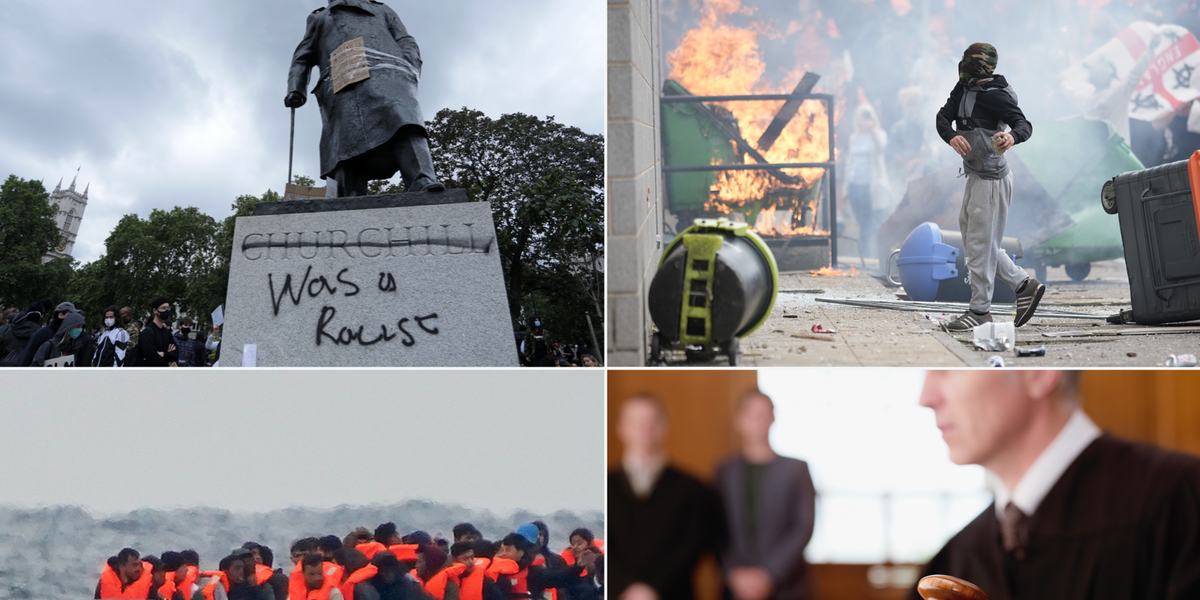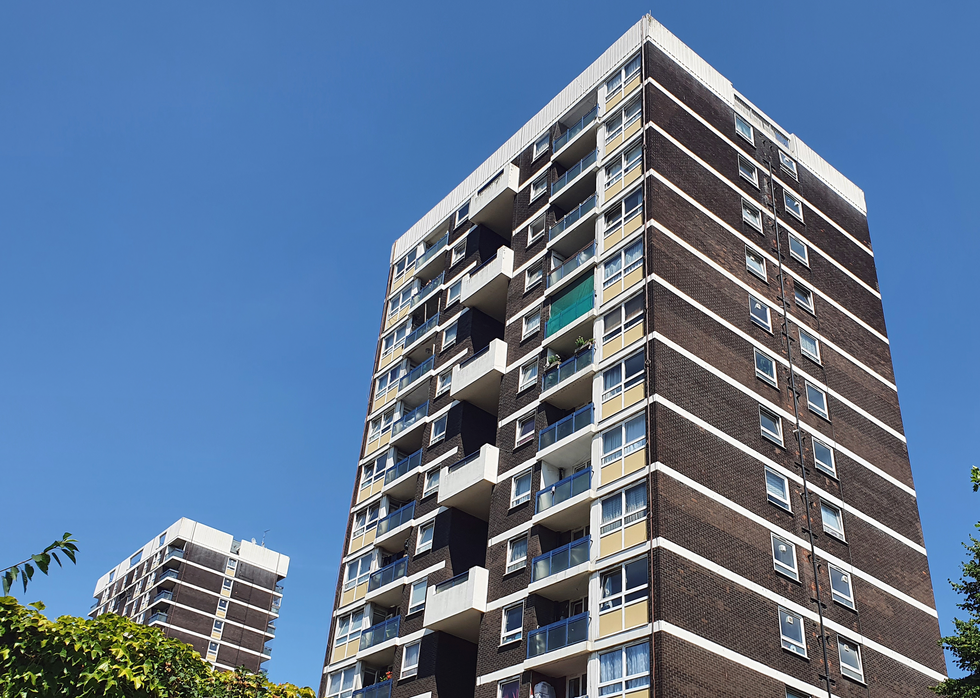World
Can Britain pull back from the brink? Voters rank the four issues DESTROYING the country

Britain is having its powder keg moment.
Sir Keir Starmer’s “loveless landslide” on July 4 was followed by weeks of unrest after three young girls were senselessly murdered in Southport.
The social and political upheaval has spread far beyond our borders, with X owner Elon Musk calling the Prime Minister ‘two-tier Keir’ over his response to the riots, adding that “Civil war is inevitable” in the UK.
How did we end up here? We put the question to more than 30,000 people in an exclusive poll – and four key issues emerged.
We take a closer look at each one.
Soft sentencing
The criminal justice system is no longer fit for purpose, hundreds of respondents said.
This is a running sore. A 2022 YouGov survey revealed two-thirds of Britons think convicted criminals should be punished more harshly by the courts.
Newly released data from the Ministry of Justice suggests they have a point. The number of career criminals avoiding jail for their offences has nearly tripled from 1,289 in 2007 to 3,325 in 2023.
And the ones that do go down only serve half their sentence, with the government promising to reduce this by a further ten per cent in a bid to ease overcrowded prisons.
Gez Chetal thinks this approach to sentencing is “crazy”.
The 57-year-old from Peterborough, who runs a not-for-profit scheme to get ex-offenders back on their feet, tells GB News that “leniency is producing more criminals”.
Britain’s justice system is also facing accusations of running a “two-tier” approach after a judge called for harsher sentences for the Southport rioters, some of whom have never had a criminal record.
Take the case of Julie Sweeney, who has no past convictions. The 53-year-old carer from Cheshire has gone down for almost two years for posting a vile comment about mosques on Facebook.
Meanwhile, critics on the right have accused the criminal justice system of taking a hands-off approach to the Harehills’ rioters in Leeds a few weeks prior, which saw largely immigrant communities rise up after social services attempted to remove four Roma kids from their family (police fled the scene).
Many respondents to our poll share the view that the criminal justice system has become politicised under Keir Starmer, with one user writing: “Now Police and even The Judiciary are using ordinary people as ‘props’ in their ‘look at me’ performances to impress their extreme intolerant audience.”
This distrust predates the new government, however. Take the anger over the grooming gangs in Rotherham, where a gang of mostly Pakistani men abused some 1,400 children over a period of 16 years.
The local police force botched the investigation over fears of being labelled racist, failing victims.
A 53-year-old carer has been sentenced to 15 months for posting vile comments about mosques on Facebook
Cheshire Police
Illegal immigration
The vast majority of respondents (80 per cent) attribute Britain’s current ills to illegal immigration – a problem that successive governments have failed to address.
The numbers speak for themselves. Nearly 5,000 small boat migrants have crossed the English Channel since Sir Keir was handed the keys to Downing Street, GB News can exclusively reveal.
The Tories’ record wasn’t much better. Despite vowing to crack down on illegal crossings for more than a decade, more boats arrived this year than for the same period in any of the previous four years.
The Conservatives’ newly-scrapped Rwandan scheme infuriated voters further still, costing £270million without a single migrant boarding a flight.
Long-simmering resentments recently came to a head after misinformation circulated on social media about the identity of the Southport stabber.
The willful destruction of property and threats to public safety have rightly been condemned but many commentators are also calling for an honest conversation about what’s fuelling the riots.
One of them is trade unionist Paul Embery, who tells GB News that fury over illegal immigration tracks along class lines and geography.
The “liberal Hampstead brigade”, as Paul refers to the cosmopolitan elite, has no truck with working-class people, many of whom live in areas that are battling the twin threats of deindustrialisation and rapid demographic change.
The anger we are seeing in our towns and cities has been decades in the making, Paul explains, with the “brakes coming off” under former prime minister Tony Blair.
This is a widely held sentiment outside of the M25. Dave, 60, grew up in Basildon, Essex, and spent many years living in nearby Southend.
He now views both as “no-go areas” due to rampant crime fuelled by mass immigration. Multiculturalism “just doesn’t work”, he tells GB News.
It is important to note the distinction between legal and illegal migration. However, one respondent to our poll claims “You can’t separate the two”, adding: “Once immigration is halted all the other problems are resolved. NHS waiting lists, school places, doctors appointments, housing shortage, economy, social cohesion all gradually return to normal levels.”
Not everyone agrees with this. Gez from Peterborough tells GB News that Britain is in dire need of skilled migration.
The hotel owner says many local businesses are struggling to recruit staff and the paperwork that has come in since Brexit means it can cost “thousands” to get two or three workers from the continent.
The 57-year-old strongly believes illegal immigration would come down if we improve the processes for skilled immigration, and it would also ease anti-immigrant sentiments in communities as locals would see the tangible benefits to the economy.
Generous welfare state
More than 10 per cent of respondents claimed a generous welfare state is to blame for Britain’s ills.
The country’s social safety net has long divided the country along party lines, with the left hailing its creation as an essential tool for eradicating poverty and hardship, while the right claims that it has created a culture of dependency.
The truth lies somewhere in the middle. What everyone can agree on is that the system is in urgent need of reform in the face of an ageing and rapidly expanding population.
It’s also a drain on the public purse – the UK is forecast to spend £315.8billion on welfare benefits this year alone.
Unlike many European countries, the UK does not provide earnings-related unemployment benefits, making its system less supportive for workers facing job loss.
However, the UK is relatively more generous when it comes to housing and family benefits.
This and other features have made it fiendishly difficult to distinguish between the genuinely disadvantaged and the work-shy.
Months before he was ejected from office, Rishi Sunak announced a raft of reforms aimed at improving this system.
The former PM pledged to strip people of their benefits after 12 months if they were fit to work and not accepting job offers.
It is unclear how Labour plans to tackle this headwind. It’s planning a review of the benefits system, although, admittedly, details are woolly at this stage.
What is clear from our polling is that reform is urgently needed to change the stigma around the welfare state, with one angry respondent telling GB News that the “overly generous” safety net is the “root cause” of Britain’s problems.
Another respondent raged at what they perceive as the unfairness baked into the system, alleging that it has “created most of the problems in this country, including attracting millions of foreigners coming to claim it”.
Others fear that it’s leading to perverse incentives, particularly among the young.
During a talk about apprenticeships at a local school, business owner Gez was shocked when a 15-year-old put his hand up and said: “Why would be interested? We can get more money signing on.”

It is fiendishly difficult to distinguish between the genuinely disadvantaged and the work-shy
Getty Images
Young people disrespecting British values
Patriotism is a dirty word among young Britons and this is causing societal decline, thousands of respondents told GB News.
Indeed, poll after poll reflects an attitudinal shift. A major YouGov study of more than 20,000 English adults revealed that young people in England are much less likely to be proud of their Englishness than their elder peers.
While approaching three-quarters (72 per cent) of people aged 65 and over who identify as English are proud of that identity, among 18-24-year-olds that falls to just 45 per cent.
In fact, close to one in ten (nine per cent) young people this age say they are actively embarrassed by their English identity, while a further 34 per cent say they are neither proud nor embarrassed,
Max Harrison has felt this aversion to all things British among his peers.
The 24-year-old Reform UK candidate for Faversham and Mid Kent told GB News: “Young people don’t respect or endorse British values at all at the education level, whether that’s schools or universities. We can’t talk about British history in a good sense.”
Max levels the blame at the curriculum that’s taught in schools and universities, which paints the British Empire as solely “negative” and heroic figures such as Winston Churchill as a racist.
“This is why young people are the least patriotic by a strong margin.”
Poll respondents agree with this analysis. Michael tells GB News young people have become “indoctrinated with harmful ideologies from socialist teachers who infiltrate education to corrupt children”.
Sir Keir might be banking on this being true. The Labour leader plans to reduce the voting age from 18 to 16 in UK general elections, working off the assumption that the young predominantly lean left.
This is not a given. Reform UK parliamentary candidate Jack Brookes believes the PM’s gamble will backfire spectacularly.
The 25-year-old tells GB News that young people “are not as stupid as people think”, adding that many of his peers, himself included, feel like they had their “best years taken away for no reason” during the pandemic – and Labour would have been even more authoritarian in its response.
Recent polling suggests Sir Keir could be in for a shock, especially if he doesn’t get a grip on immigration.
The latest figures from YouGov show that 43 per cent of 18-24s believe that immigration has been too high over the last 10 years; just nine per cent think that it has been too low.
Amongst those aged 25-49, that gulf is even larger, with 55 per cent saying too high, and six per cent saying too low.










